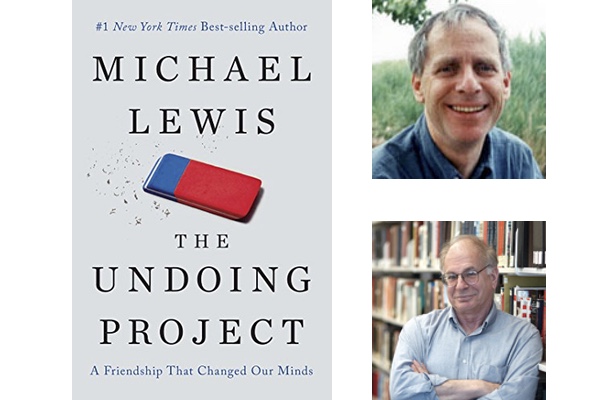The Best Seller Historians Shouldn’t Overlook
A book some historians might be tempted to pass up – Michael Lewis’s new blockbuster – includes a section they’ll no doubt find fascinating (and perhaps a bit alarming). In his latest book The Undoing Project, #1 New York Times best-selling author Michael Lewis explores the impact of psychologists Daniel Kahneman and Amos Tversky, who transformed our understanding of the peculiar workings of the human brain.
In the spring of 1969, Kahneman invited Tversky to be a guest lecturer in one of his courses at Hebrew University. In an unlikely turn of events, Tversky, the more resolute of the two, left questioning his own assumptions about psychology. From this moment on the two became intimate friends. Their friendship is one of the most remarkable in the history of the academy. As Lewis puts it, “What they were like, in every way but sexually, was lovers,” and in the true spirit of collaboration, they shared joint credit for all of their ideas, since it was impossible to distinguish how a specific idea originated.
The two Jewish professors turned the study of psychology upside down. According to their Prospect Theory people do not “choose between things”; rather, they choose “between descriptions of things” because rational people try to rationalize loss aversion. That means we feel losses more intensely than gains. To demonstrate this point, they provided the following series of hypothetical situations to economists:
Problem A. In addition to whatever you own, you have been given $1,000. You are now required to choose between the following options:
● Option 1. A 50 percent chance to win $1000
● Option 2. A gift of $500
Most people chose option 2 because it was a guaranteed gain.
Problem B. In addition to whatever you own, you have been given $2,000. You are now required to choose between the following options:
Option 3. A 50
percent chance to lose $1,000
Option 4. A sure loss of $500
Even though the situations are virtually the same, in problem B, most people opted to take the gamble. According to Kahneman and Tversky, when a situation is described as a gain, people are more likely to choose it than when the choice is framed as a loss.
Kahneman and Tversky’s analysis of everyday biases changed the way we understand the challenges that humans face when required to make a decision. Even historians, despite intensive training, are not immune to the tug of biases of various kinds, as Tversky demonstrated in a lecture titled “Historical Interpretation: Judgement Under Uncertainty.” In a 1972 lecture, Tversky explained to a group of historians how some historical facts may not be factual at all. While humans are able to detect patterns in random data, patterns become problematic when they are used to overemphasize the likelihood of an event. According to Baruch Fischhoff, one of Tversky’s graduate students at Hebrew University, this phenomenon is known as the “hindsight bias” because one is more likely to assign value to certain factors after an event occurs in order to provide a stronger narrative. Good historians are confident in their theses; however, it is easier to assign certainty to events that already happened than to assign certainty to future events. Tversky called this “creeping determinism.” The result? “[H]e who sees the past as surprise-free is bound to have a future full of surprises.”
Tversky demonstrated that it was not only possible, but also necessary, to reexamine the past with a difference perspective. The historians entered his lecture with confidence in their profession, but “they left ashen-faced,” according to a psychologist who attended the event.
Tversky and Kahneman’s work can be applied to the 2016 election cycle. Many of the top polls predicted that Hillary Clinton was poised to become the 45th President of the United States. What happened when Donald Trump won? Within days the media were filled with stories showing why it was inevitable that Trump won. There was no shortage of explanations. Some suggested he won because the movies had changed the electorate. Others said Hillary Clinton just wasn’t inspiring and so people stayed home. What once had been inconceivable – that Trump would win – now seemed perfectly understandable. Too understandable?
